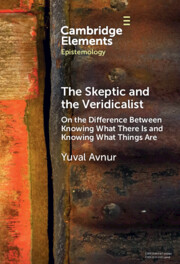Element contents
The Skeptic and the Veridicalist
Published online by Cambridge University Press: 18 December 2023
Summary
Information
- Type
- Element
- Information
- Series: Elements in EpistemologyOnline ISBN: 9781009243308Publisher: Cambridge University PressPrint publication: 18 January 2024
References
Accessibility standard: Unknown
Why this information is here
This section outlines the accessibility features of this content - including support for screen readers, full keyboard navigation and high-contrast display options. This may not be relevant for you.Accessibility Information
- 13
- Cited by
